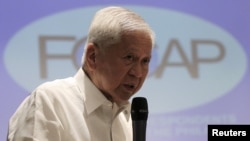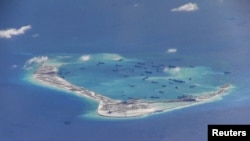The recently retired Foreign Affairs secretary of the Philippines says the country’s position on the South China Sea dispute should continue well into the next administration, which will be determined in May elections.
Three days after he left his post, former secretary Albert del Rosario told reporters Friday that the Philippines should remain “independent, being principled in a manner adhering to rule of law.”
“The next administration should consider staying the course because apparently the people have approved of the foreign policy that we have embraced,” he said.
In his speech at a luncheon, del Rosario said the results of a recent survey showed three of the top four issues Filipinos feel the current administration handled well fell under his department. One of them was on promoting and defending the country’s maritime sovereignty.
The Philippines, Brunei, Malaysia, Taiwan and Vietnam all have competing claims in the South China Sea, while China has said it has “indisputable sovereignty” over almost all of the sea and its islands. Among the five claimants, the Philippines, led by del Rosario for the past five years, has been the most vocal in opposing China’s claim.
‘Excessive claims’
Manila has challenged the legality of what it calls Beijing’s “excessive claims” to the resource-rich, heavily traveled sea. In 2013 it filed an arbitration case under the International Tribunal for the Law of the Sea, questioning the lawfulness of the claim and seeking clarification on whether disputed formations in the sea were rocks or islands.
China rejects the case, saying it opted out of participating in arbitration when it signed on to the U.N. Convention on the Law of the Sea.
In the past two years, China has developed seven formations, most of which are listed in the Philippines case, turning them into artificial islands. At least three can support military craft and defense hardware.
The 76-year-old Del Rosario, who cited health issues for retiring three months before of the end of President Benigno Aquino’s term, said such moves “have seriously heightened tensions and further highlight the urgency of an early promulgation of the [arbitration tribunal’s] decision.”
Aquino is stepping down at the end of June. Presidential candidate Mar Roxas, whom Aquino picked as his party’s successor, is looking to continue the current policy.
Opposition candidate Jejomar Binay has taken a softer stance toward China, although he has also said he will defend the Philippines’ sovereignty. But he has said joint exploration in the disputed sea between the two countries would help the Philippines tap into China's economic might.





